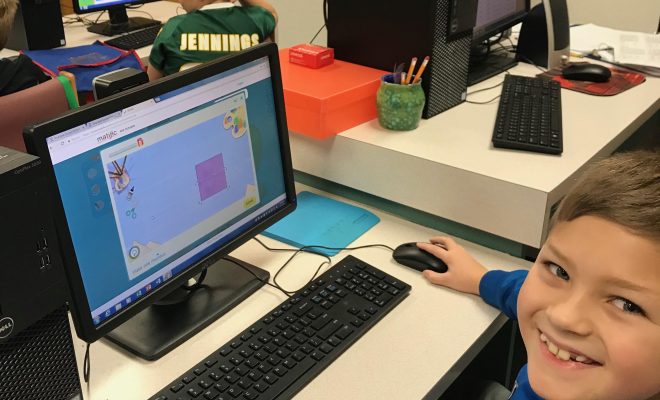What the heck is STEM? (And eight other questions you might be too embarrassed to ask.)

Originally posted on Chalkbeat by Nicholas Garcia
STEM … it’s not your father’s science class. But what the heck is it?
It’s a good question. Chalkbeat has spent months exploring efforts across the state to bring a special blend of science, technology, engineering and math to more classrooms.
Below are eight questions we asked time and time again, and what dozens of educators and activists from across the state told us.
What is STEM?
STEM is an acronym for science, technology, engineering and math.
But it’s more than that. STEM is an integrated, interdisciplinary approach to learning a variety of subjects and skills that exposes students to hands-on experiences. It’s all an effort to prepare students for the 21st century economy.
STEM isn’t just for students who want to grow up to build buildings or mobile apps, educators and activists emphasize. Because at its heart STEM is about problem-solving, it’s really for everyone, they say.
My kids take science and math classes. Is that STEM?
Possibly. But ask yourself: Are my students just reading about renewable energy? Or are they doing things like studying what forms of renewable energy could run an entire high school, and then presenting their findings to renewable energy experts?
That’s one example of work students at Pueblo Central High School did last year. The school, which is already outfitted with solar panels, wants to do even more to reduce its carbon footprint. In the end, students presented ideas to local power company officials.
By the way, the majority of the students’ work on that project took place during their English class, not their science class. That’s because many STEM advocates argue the best programs ask students to put various skills — including reading, writing and public speaking — to use to create a product and present it.
Why has STEM become such a buzzword in education?
STEM is attractive for a number of reasons. But the top two reasons Chalkbeat heard time and again are that schools have a responsibility to prepare students for a new digital economy and that the project-based learning inherent to STEM keeps students engaged.

While estimates vary, at least 20 percent of all Colorado jobs are in STEM fields. And that number is not going to shrink. The Colorado Workforce Development Council has reported that 62 percent of the state’s top jobs — those that are in growing industries and guarantee a middle-class income — will require STEM training.
Meanwhile, there’s been a broader nationwide push to get students thinking more critically. Classrooms across the county are ditching bubble tests for projects and writing responses.
STEM, done correctly, fits with this national movement — and students seem to be responding. Ask any STEM teacher, and they’ll tell you their classroom is more alive than ever with students who are engaged with their work. Students, for the first time in a long time, see the connection between what they’re learning and their future lives, educators say.
“Students are demanding a greater degree of relevance,” said Chris Gdowski, the superintendent of the Adams 12 Five Star School District, which has been a leader in STEM education in Colorado.
OK, this all sounds great. But surely there must be criticism of STEM?
Yes. Some critics worry that more science and technology means less literature and art. Or that students’ imaginations are being stifled. Others fret about too much screen time — especially for younger kids — and about exacerbating a digital divide between students from low-income homes and their more affluent peers.
STEM supporters counter that quality STEM programs rely on all the traditional school subject areas, and that STEM encourages students to think more creatively than in traditional classrooms because students are usually creating something during the day.
As for screen time, some educators in the STEM schools we visited voiced a similar concern and said they were taking steps to monitor device usage.
Meanwhile, the federal government, foundations and businesses have donated large sums of cash and technology to schools in a bid to address the tech divide.
What does STEM look like in schools?
While no two STEM experiences are the same, Colorado students who sign up for STEM courses usually experience them in one of three ways.
On one end of the spectrum are course-specific classes, such as computer science, that students sign up for during their middle and high school years. These courses, sometimes called “pathways,” build upon one another and are usually found at traditional neighborhood high schools. Engineering, computer science and bioscience are among the most popular.
On the other end of the spectrum are entire schools built around STEM. These schools, usually charters or magnet schools that families must choose, are built on a foundation of project-based learning and embed elements of STEM into every course — from English to electives. At STEM School in Douglas County, students in band class are asked to create a studio-grade album.
Increasingly, both traditional district-run and charter schools alike are attempting to find a middle path that calls for teachers across multiple subjects working together to develop lessons that allow students to use everything they’re learning to solve a problem.
STEM educators we spoke to are split on which method is the best. But if you ask students — as we did — the more hands-on work, the better. One student whose only chance at STEM work was a designated electronics class said: “This is the only class that offers hands-on projects. Other teachers just give us worksheets. Creating something is very interesting to me.”
Is there STEM curriculum in Colorado?
Colorado is a “local control” state. That means districts and schools choose their own curriculum. So the short answer is no. But there are some popular off-the-shelf STEM products many schools use. One we repeatedly encountered is called Project Lead the Way.
PLTW — as the cool STEM kids call it — are pre-packaged projects aligned to grade-specific standards teachers from elementary to high school can use in their classrooms. The nonprofit also offers an abundance of teacher training.
While many educators rave about PLTW, they do caution it can be costly.
So is it expensive to start a STEM program?
It can be.

But several free resources exist, said Cameron Ryan, a computer science teacher who left Microsoft to teach at Dougulas County’s STEM School and Academy. The hard part is finding the right program for the lesson at hand.
A number of private foundations and businesses are willing partners, prepared to donate time, money or equipment.
Still, STEM educators and advocates argue the most important part of a quality STEM program is the how not the what. That means it’s more important for teachers and students to be working together on low-cost projects that will develop 21st century skills than sticking a kid in front of the latest technology with no direction.
What are some qualities that make up a good STEM program?
We’ve already addressed some of them, but to put it all together, STEM educators told us these qualities (in no particular order) are most important to have:
- Learning should be project-based, and usually conducted in groups.
- Ditch the bubble test. Students should be asked to produce something.
- Students should be encouraged to fail and fail often — and should not be penalized for doing so.
- Students should have to call on a variety of skills from all content areas to fulfill the project.
- Soft skills, like teamwork and problem solving, are just as important as knowing how to solve an algebra equation and other content knowledge.
- Schools or classrooms should have “industry partners,” individuals from tech or engineering companies who can lend expertise in the classroom.
- Students should have access to after-school clubs, associations and contests.
What are some barriers schools encounter when they try to adopt a STEM model?
Other than cost, what we heard from more than a few STEM leaders is the shift teachers must make in their classrooms can be difficult.
“It’s a different type of teaching,” said Ginger Slocum, the former principal of Highland Park Elementary.
A quality STEM program asks teachers from a variety of content areas to work together to develop shared lessons, in some cases starting from scratch. Teachers must also abandon tried-and-true worksheets for assignments that ask students to think and write critically. And lastly, teachers are encouraged to allow students to try new concepts. That means less lecturing and a greater focus on helping students explore what interests them.
Chalkbeat is a nonprofit news site covering educational change in public schools.





